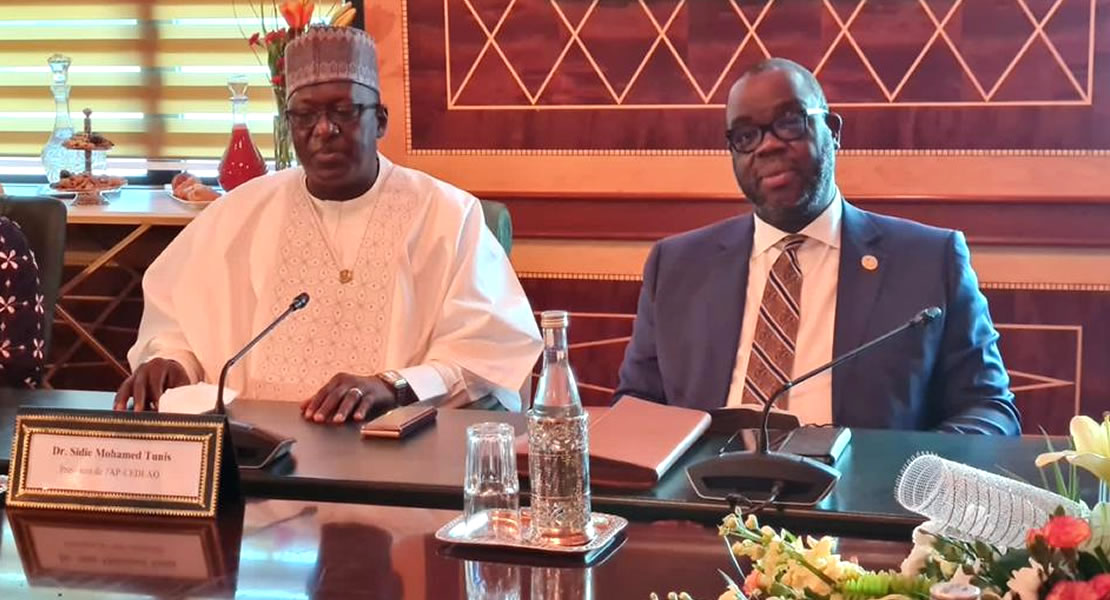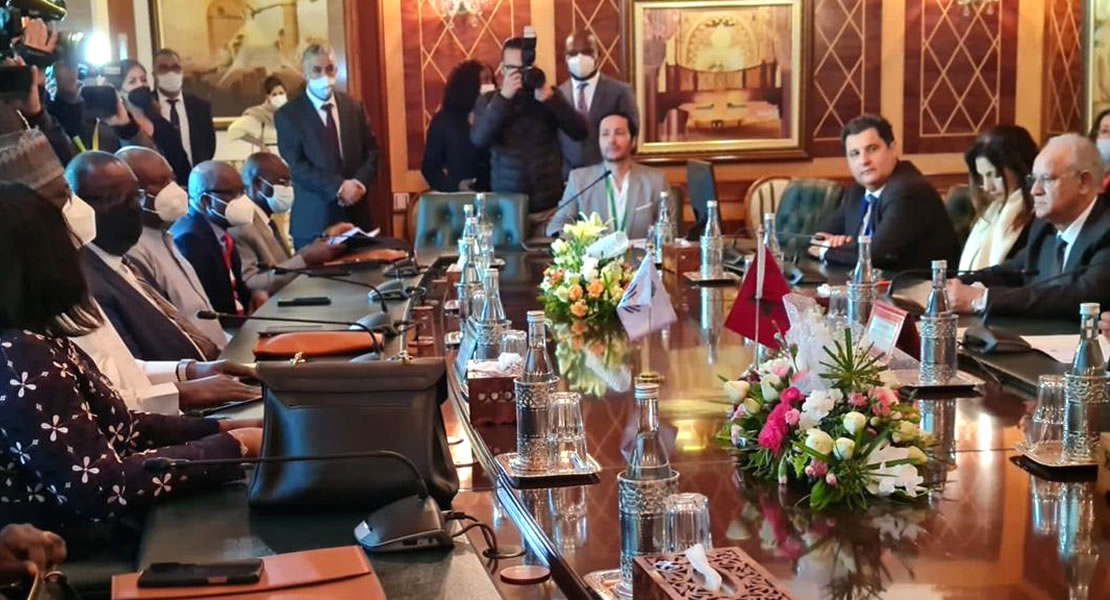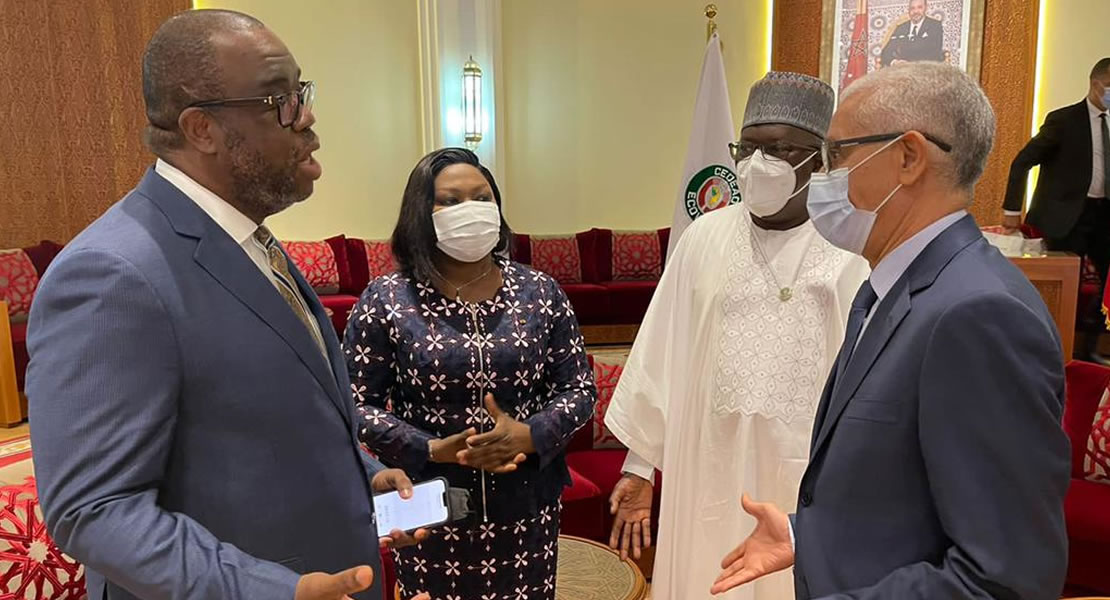
Speaker of the ECOWAS Parliament, Rt.Hon. Dr. Sidie Mohamed Tunis has emphasized the need to boost trade relations between ECOWAS nations and the Kingdom of Morocco to boost economic growth.
He underscored the need for alliances to be forged between sub-regional blocs and among all African countries to foster development, prosperity and peace building so that the continent will take its pride of place among other continents.
Tunis while addressing the Moroccan House of Councilors at the opening of the 6th International Parliamentary Forum on Social Justice, emphasized that the trade relations between Morocco and West Africa was currently low, pointing out the need for it to be scaled up.
The Forum opened in Rabat, Kingdom of Morocco on February 20 and has as its theme: “Social Dialogue and the Stakes of the Social State”
 Dr, Tunis who led a delegation of ECOWAS parliamentarians and staff of the sub-regional body, commended His Majesty King Mohamed VI (The Sixth) and His Excellency, Ennaam Mayara, Speaker of the House of Councilors for the honor accorded to him and to ECOWAS.
Dr, Tunis who led a delegation of ECOWAS parliamentarians and staff of the sub-regional body, commended His Majesty King Mohamed VI (The Sixth) and His Excellency, Ennaam Mayara, Speaker of the House of Councilors for the honor accorded to him and to ECOWAS.
Morocco’s fight against illegal migration, terrorism, extremism, and the speedy recovery of the Moroccan economy, despite the unprecedented repercussions of the COVID-19 crisis and the contraction of the global economy, are worthy of commendation, and we hail His Majesty for the leadership.
He pointed out that ECOWAS had recognized Morocco’s policies as regards ECOWAS countries as well as the numerous reforms undertaken in order to successfully integrate itself into the global economy and Africa in particular.
“We equally acknowledge the low level of trade with ECOWAS countries, the barriers to free movement of peoples and the weak dynamism of our partnership, all of which could be boosted with the development of appropriate frameworks for enhanced trade cooperation.
“We are hopeful that sooner rather than later, an equilibrium relationship between the Kingdom of Morocco and ECOWAS will be established, thereby paving the way for strengthened economic, political and investment ties. It remains an incontestable fact that because of our intertwined relationship, the prosperity, stability and security of one side, has a direct effect on the other. The global dynamics and insurmountable challenges to which our world has been subjected to, necessitates that both sides think out of the box and see the vast potential for prosperity and development that our union can bring.
Such alliances, when successfully forged would, no doubt, usher in the beginning of the process of a new regional development trajectory, aimed at giving our continent a sense of peace, dignity and prosperity.”
 “We hold the view that if we want a continent that is fair and prosperous; a region in which the uncommon dreams of all will have a fair chance of realization; a region where the weak can become strong; then the leaders of today must rise up to these challenges and work assiduously towards promoting genuine and durable collaboration,” the Speaker said.
“We hold the view that if we want a continent that is fair and prosperous; a region in which the uncommon dreams of all will have a fair chance of realization; a region where the weak can become strong; then the leaders of today must rise up to these challenges and work assiduously towards promoting genuine and durable collaboration,” the Speaker said.
Giving an insight into the commemoration of the day, Dr. Tunis said that the Forum came as a consequence to the UN General Assembly’s proclamation, declaring 20th February as World Day of Social Justice – challenging states to devote the day to promoting national activities in accordance with the objectives and goals of the 1995 World Summit for Social Development related to conquest of poverty, the goal of full employment and the fostering of overarching objectives of development and social integration.
He admitted that COVID-19 had put so much pressure on the global economy with mass layoffs, pressure on businesses, severely deteriorating working conditions and access to basic social protection in countries around the African continent, but added that states must do all it can to advance social justice.
He opined that there was a need to support regional advocacy and local social dialogue at work to create a solid foundation for the commitment of employers and workers to joint action with governments in taking strategic measures to overcome crisis and obtain sustainable recovery.
He pointed out that ECOWAS and its member states had ratified: The Forced Labor Convention, 1930 (No. 29); The Abolition of Forced Labor Convention; 1957 (No. 105); The Discrimination (Employment and Occupation) Convention, 1958 (No. 111); The Right to Organize and Collective Bargaining Convention, 1949 (No. 98); The Equal Remuneration Convention, 1951 (No. 100) and The Worst Forms of Child Labor Convention, 1999 (No. 182).
He charged the House of Councilors to dedicate the next few days to reviewing all the reports and studies made on the subject and endeavor to enrich collective reflection on the challenges and issues related to social dialogue and its stake on the social state.
Meanwhile, rising from the opening session, the Speaker also held two separate meetings with the Speaker of the Moroccan House of Councilors, Hon. Ennaam Mayara and Speaker of the Moroccan House of Representatives, Mr. Rachid Talbi El Alami.
In both meetings, the need to enhance relations between Morocco and West Africa as well as forging bilateral relations between the ECOWAS Parliament and the Parliament of Morocco were considered.
Also highlighted at the meetings was the appeal by Morocco to move from an observer status to become a permanent member of the sub-regional body, ECOWAS.
The Speaker of ECOWAS Parliament assured that he would work with his colleagues to give relevant support to improve the relations between ECOWAS and Morocco and the possibility of attaining a permanent membership status.
On the delegation of Dr Tunis were: Chairman of the Committee on Political Affairs, Peace, Security and Africa Peer Review Mechanism; Third Deputy Speaker, other members of the Parliament as well as the Secretary General and other senior staff of the Parliament.
Ghanamps.com